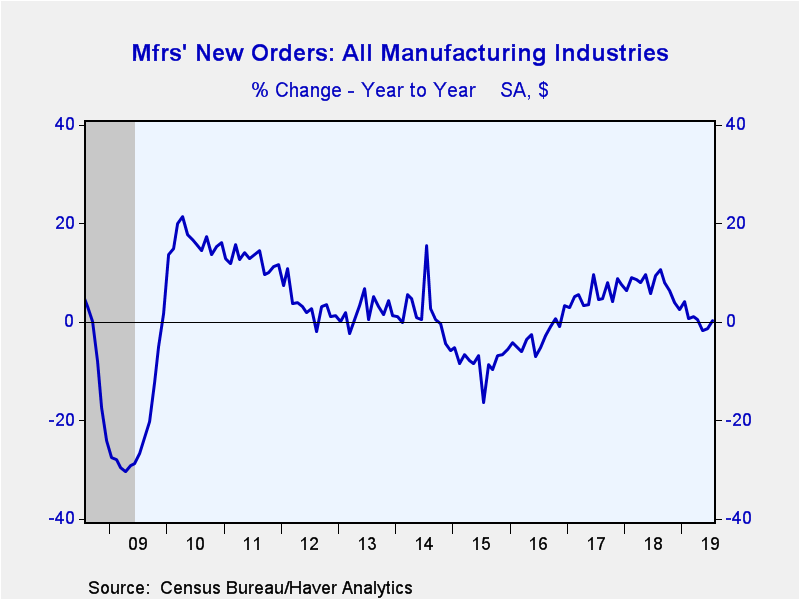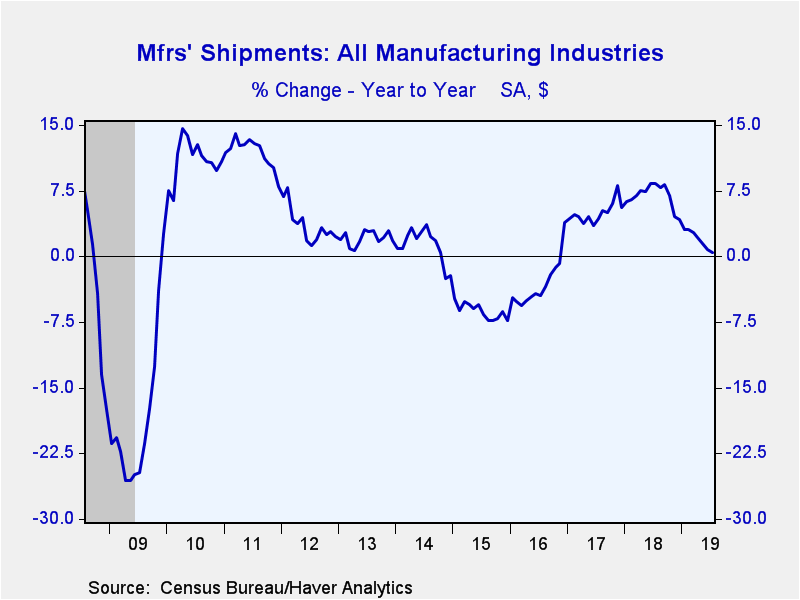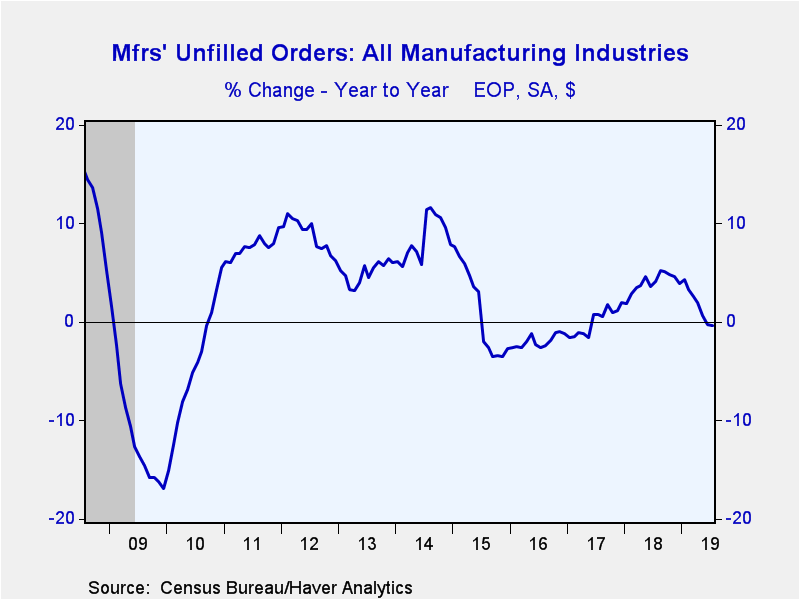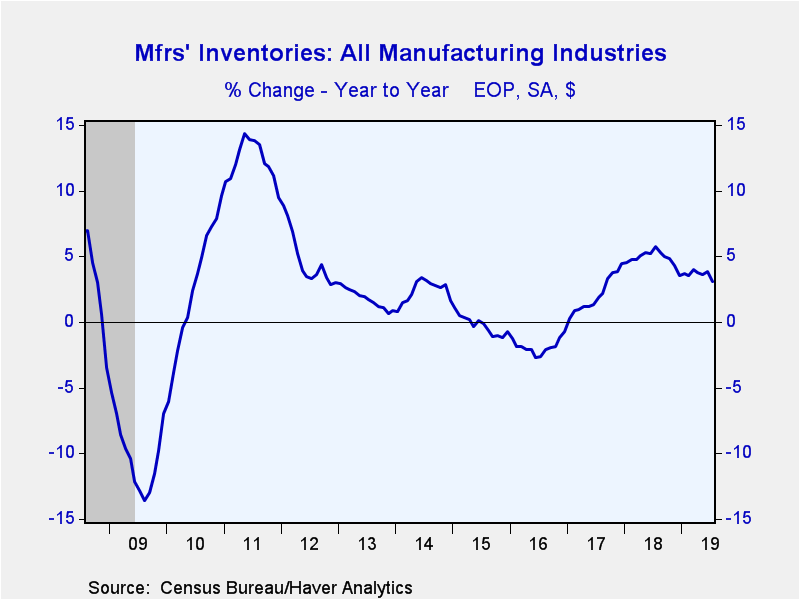 Global| Sep 05 2019
Global| Sep 05 2019U.S. Factory Orders Strengthen
by:Tom Moeller
|in:Economy in Brief
Summary
Manufacturers' orders rose 1.4% during July (0.3% y/y) following a little-revised 0.5% June gain. The Action Economics Forecast survey expected a 1.2% increase. Durable goods orders jumped 2.0% (0.6% y/y) after a 1.8% decline. The [...]
Manufacturers' orders rose 1.4% during July (0.3% y/y) following a little-revised 0.5% June gain. The Action Economics Forecast survey expected a 1.2% increase.
Durable goods orders jumped 2.0% (0.6% y/y) after a 1.8% decline. The gain compared to an advance report of a 2.1% rise. A 7.0% jump (2.3% y/y) in transportation sector orders led the overall rise, as nondefense aircraft orders surged. Electrical machinery orders rose 0.5% (4.8% y/y) and computer & electronics orders improved 0.4% (1.3% y/y).
Total shipments eased 0.2% (+0.5% y/y). Shipments of nondurable goods, which equal orders, rose 0.8% (-0.1% y/y) after a 0.7% decline. Shipments from petroleum refineries surged 2.9% (-5.6% y/y) after two months of sharp decline. Textile mill shipments gained 0.7% (-1.1% y/y) but apparel shipments dropped 2.8% (-1.4% y/y). Paper product shipments were little-changed (0.3% y/y) while food product shipments rose 0.8% (0.7% y/y).
Shipments of durable goods declined 1.1% (+1.0% y/y) after a 0.9% rise. Machinery shipments fell 1.9% (-0.6% y/y) and electrical equipment shipments eased 0.2% (+4.2% y/y). Transportation sector shipments declined 2.0% (+2.3% y/y) as nondefense aircraft shipments weakened 16.2% (-13.0% y/y). Shipments of electrical equipment & appliances eased 0.2% (+4.2% y/y) but computer & electronic product shipments improved 0.2% (3.2% y/y).
The level of unfilled orders of durable goods were unchanged following three straight months of decline. Primary metals backlogs rose 0.5% (2.8% y/y). Unfilled orders of machinery held steady (-1.5% y/y) while computer & electronic product backlogs rose 0.1% (2.7% y/y). Electronic equipment & appliance unfilled orders jumped 1.1% (1.0% y/y). Unfilled orders for furniture declined 1.0% (-1.1% y/y).
Inventories in the factory sector rose 0.2% (3.1% y/y) during July. Auto inventories surged 2.7% (21.3% y/y). Machinery inventories gained 0.4% (5.8% y/y) for the second straight month. Electrical equipment & appliance inventories rose 0.4% (8.2% y/y) but computer & electronic product inventories fell 0.2% (+0.4% y/y). Nondurable goods inventories eased 0.1% (+0.8% y/y) as petroleum inventories also slipped 0.1% (-4.9% y/y). Food products inventories rose 0.2% (1.1% y/y). Inventories of textile products rose 0.6% (2.7% y/y) but chemical product inventories eased 0.3% (+1.5% y/y).
The factory sector figures are available in Haver's USECON database. The expectation figure is in the AS1REPNA database.
| Factory Sector (% chg) - NAICS Classification | Jul | Jun | May | Jul Y/Y | 2018 | 2017 | 2016 |
|---|---|---|---|---|---|---|---|
| New Orders | 1.4 | 0.5 | -1.3 | 0.3 | 7.3 | 5.7 | -2.9 |
| Shipments | -0.2 | 0.1 | 0.1 | 0.5 | 6.9 | 5.0 | -3.2 |
| Unfilled Orders | 0.0 | -0.6 | -0.8 | -0.4 | 3.9 | 1.9 | -1.1 |
| Inventories | 0.2 | 0.1 | 0.2 | 3.1 | 3.5 | 4.5 | -0.7 |
Tom Moeller
AuthorMore in Author Profile »Prior to joining Haver Analytics in 2000, Mr. Moeller worked as the Economist at Chancellor Capital Management from 1985 to 1999. There, he developed comprehensive economic forecasts and interpreted economic data for equity and fixed income portfolio managers. Also at Chancellor, Mr. Moeller worked as an equity analyst and was responsible for researching and rating companies in the economically sensitive automobile and housing industries for investment in Chancellor’s equity portfolio. Prior to joining Chancellor, Mr. Moeller was an Economist at Citibank from 1979 to 1984. He also analyzed pricing behavior in the metals industry for the Council on Wage and Price Stability in Washington, D.C. In 1999, Mr. Moeller received the award for most accurate forecast from the Forecasters' Club of New York. From 1990 to 1992 he was President of the New York Association for Business Economists. Mr. Moeller earned an M.B.A. in Finance from Fordham University, where he graduated in 1987. He holds a Bachelor of Arts in Economics from George Washington University.
More Economy in Brief
 Global| Feb 05 2026
Global| Feb 05 2026Charts of the Week: Balanced Policy, Resilient Data and AI Narratives
by:Andrew Cates










